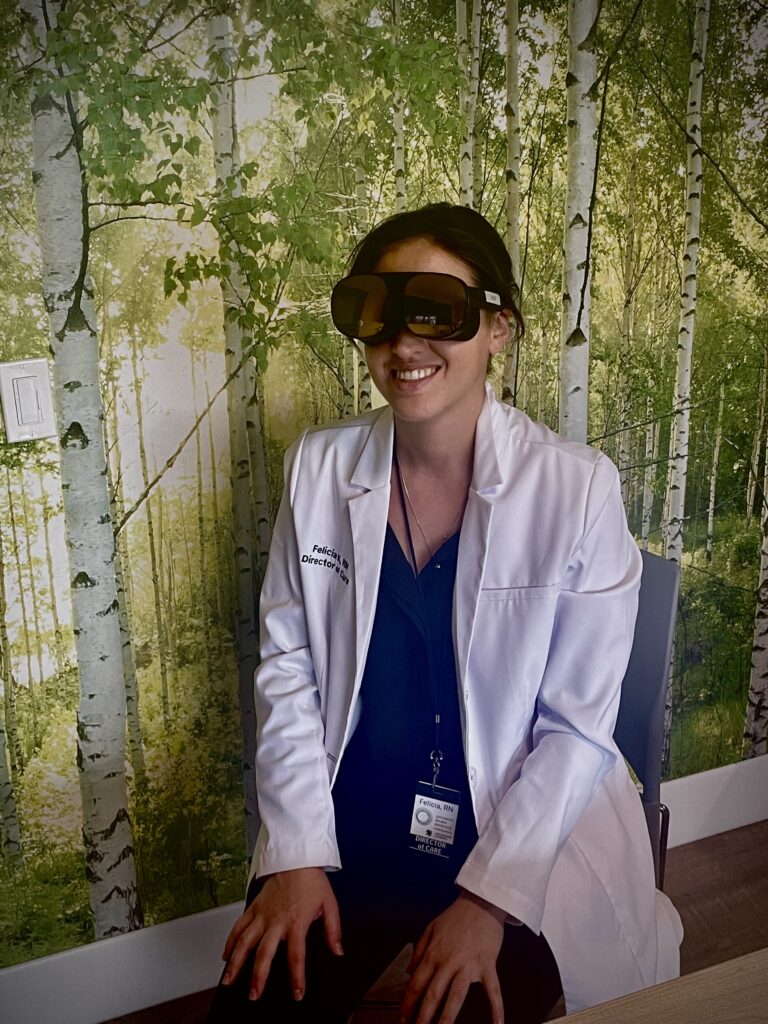What is the link between the heart-pounding thrill of free-falling from a plane while skydiving; serenity, peace, and calm felt while exploring a hidden rainforest; awe and fascination while taking in masterpieces like the Mona Lisa; and pure, simple joy watching puppies play in a field of summer flowers? All these experiences – and more – are now available for patients and their loved ones to share at Journey Home Hospice (JHH) thanks to an innovative new pilot of virtual reality (VR) technology with MyndVR.
When Jason (we’ve changed his name to protect his privacy) was admitted to Journey Home Hospice, his life had been full of challenges. Having experienced homelessness beginning in his early twenties, at the age of 63, he now faced a terminal cancer diagnosis, and the realization some of his early dreams would never be realized. Jason’s story is a good representation of the patients admitted to Journey Home Hospice offering 24/7 residential hospice palliative care in the heart of downtown Toronto, specifically designed to meet the needs of patients experiencing homelessness and structural vulnerability. Operated by the Saint Elizabeth Foundation (SE Health), the hospice offers specialized programs promoting a trauma-informed, culturally safe, and harm-reducing approach to care, where innovation and wellness are entrenched in the holistic services it provides.
“Our patients are most often vulnerable and have lived lives heavily influenced by poverty, stigmatization, and structural barriers to care,” reflected Felicia Kontopidis, RN, Director of Care. “Most of them have not had the means or the opportunity to travel or prioritize experiences in their lifetime. The virtual reality program is opening doors that they never thought could be possible.”
The process of choosing a company to work with on the VR project was led by the SE Health Innovation and Digital Health Team. According to MyndVR, virtual reality technology is a new type of digital therapeutic, utilizing software to address mental and physical conditions in patients through prevention, management, or treatment alongside traditional medical approaches. Their VR programming and technology draws on 30 years of scientific research demonstrating that immersive technology can have four key benefits: “induces and maintains positive emotional states; reduces the perception of pain as a distraction technique; reduces feelings of isolation and loneliness; and counteracts negative emotional states and so much more.”
Embracing the spirit of innovation, SE has an unwavering dedication to excellence as we aim to connect, innovators, researchers, frontline staff, academia, and external partners to find innovative solutions to ensure exceptional patient experiences,” stated Mary Lou Ackerman, VP, Innovation and Digital Health. “Not only do patient benefit from the virtual reality experiences offered through this organization, but we also have confidence that the choice of material will demonstrate health and wellness benefit beyond pure recreation.”
The technology itself is very simple to use: a lightweight pair of goggles is paired with a tablet to access original and licenced VR content, offering hundreds of 360 experiences that can be activated alone or shared with a friend or family member. MyndVR content is particularly curated with older adults in mind and their catalogue contains a mix of comforting nostalgic experiences coupled with more intense adventure scenarios that may help individuals cross off bucket-list activities like skydiving, roller coaster rides, or even scuba diving.
“Our mission is to empower users to reach their therapeutic goals by making therapy fun, engaging and rewarding using virtual reality,” said Chris Brickler, CEO of MyndVR. “We are building the most advanced portfolio of original and licensed therapeutic VR content that enables older adults to interact with the outside world in innovative ways that promote engagement, wellness, and positive outcomes. Today, thousands of seniors across Canada, the United States, Australia and the UK are using MyndVR to make their experience with aging one that is boundless and freeing, rather than limiting.”
At Journey Home Hospice, patients use the VR goggles to revisit favourite memories, or engage in adventures they may not be able to physically accomplish at end-of-life, integrating seamlessly into existing wellness activities at the hospice. For example, one patient who had never been outside the city is able to take virtual trips with his father, bringing both a sense of joy and adventure. The street view add-in to the VR goggles also allowed another patient to stroll through their neighbourhood and revisit their childhood home, which they hadn’t seen in decades. Especially important, the VR experiences do not require a patient to be mobile to enjoy the therapeutic benefits. The lightweight goggles can be used while lying in bed, sitting in a chair, or even enjoying the sunshine in one of the common solarium spaces. Patient feedback from the first two months of use indicated that 60% of users felt happier and less lonely after a VR experience, also expressing interest in using the technology again in the future.
The VR program is just one example of how technology is shaping hospice care at Journey Home Hospice. “We need to specialize our care to meet the unique needs of our patients,” said Nancy Lefebre, COO, SVP, SE Health. “Last year we introduced an electronic health record that improved our patient safety and care outcomes. This year we’re looking to engage with technology to impact the full continuum of holistic care services in a socially innovative way.” Using technology in every aspect of patient care at the hospice has allowed the interdisciplinary team to re-examine what’s possible when providing care, especially for patients at end-of-life.
Read the article in Canadian Healthcare Technology Magazine
